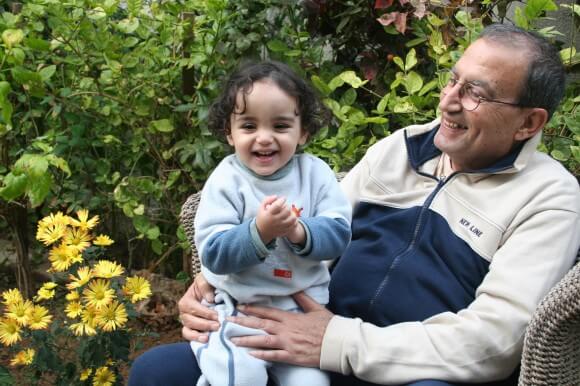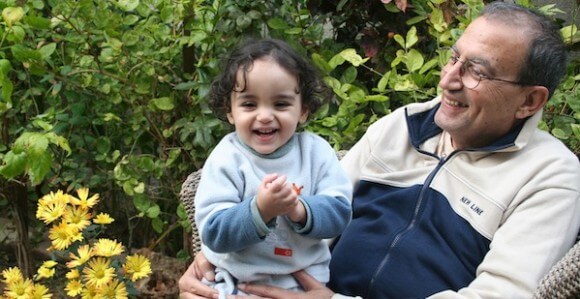
Dr. Eyad el Sarraj, who died on December 17 at the age of 70 and is being buried today in the Gaza Strip, was intimately acquainted with trauma and what cycles of violence do to the human psyche and society.
The founder of the Gaza Community Mental Health Programme in 1990, he made helping people move beyond their personal and collective trauma to recognize the basic humanity of all human beings his life’s work.
Human rights and mental health went hand in hand for a man who, as a four year old, was forced to flee with his family from Bir al-Saba’ (now Beersheva) to Gaza when the State of Israel was established. After Gaza and the West Bank came under Israeli occupation in 1967, his father and brother were among the hundreds of thousands of Palestinians who were arrested and faced torture under interrogation.
As he told the Boston Globe in April 1997 when he was in Boston to receive the first human rights award given by the Physicians for Human Rights, “I started as a physician in Gaza and did not want to be involved in politics. But many of my patients were victims of torture and I became drawn into advocacy. Defending human rights is my major obsession.”

Eyad el-Sarraj studied medicine in Alexandria, Egypt in 1971 and in 1973 went to London to study psychiatry. He became the Gaza Strip’s first psychiatrist when he returned there in 1977.
I first met Eyad when I went to Gaza in 1988 as part of a fact-finding delegation soon after the first intifada began. I will never forget the shock of seeing hospitals full of young men and children who had endured the “force, might and beatings” that then Israeli Defense Minister Yitzhak Rabin had ordered to put down an unarmed uprising of the entire population, and of hearing the screams, gunshots and the wailing of ambulances all night long.
In 1988 and for the next five years, a 7 PM curfew was imposed Palestinians – sometimes they would endure house arrest for days or even weeks at a time, but every night they had to be off the streets by 7 PM.
The driver of one small white Renault was not about to abide by this military order. Instead, every evening Eyad would go where he was needed, giving solace and medical attention. He made no attempt to avoid the IDF convoys, but instead would purposefully go his way, sometimes with me in the passenger seat.
So brazen was he in breaking the rules that the soldiers must have assumed he had a special permit – which he did not. What he did have was the determination to live in open, nonviolent defiance of occupation, both as an assertion of his own humanity, and in recognition of the humanity of others, Israelis as well as Palestinians.
There was a feature story about Eyad in the Canadian magazine Equinox, published in February 1995, which illustrates this quality:
“He was once stopped during the Intifada and ordered by an Israeli soldier to extinguish flames from a burning tire with his bare hands. He refused the order. When the soldier threatened to take his identification card, el-Sarraj didn’t protest. ‘Go ahead, take it, I don’t care,’ he said. And when the soldier threatened to beat him, el-Sarraj said, “Go ahead, but before you do, I know there is a real human being behind that uniform, and I would like you to show me that person.’ The soldier got tears in his eyes, and then he just walked away.”
How was it possible to maintain sanity under the dehumanizing conditions of occupation? While the first Intifada at its peak, Eyad set about creating a center that would work to overcome the stigma attached to mental illness, and provide family and community based treatment on a huge scale. I well remember a discussion we had in 1989 about his ideas for the Gaza Community Mental Health Program (GCMHP). It sounded to me like it would be a project of many years in the making.
But the very next year when I visited Gaza, the headquarters was already built and the staff was being trained. Soon, the GCMHP had clinics in the refugee camps, and had established a range of training programs, crisis intervention programs, special projects that worked with children and empowered women, and a training and education department offering courses for teachers and nurses, as well as a postgraduate diploma in Community Mental Health and Human Rights.
By the mid 1990s, Dr. el Sarraj had become the Commissioner General of the Palestinian Independent Commission for Citizens’ Rights. When, in 1995 and then again in 1996, he criticized the human rights practices not just of the Israeli occupiers, but of the Palestinian Authority, he was arrested on three occasions, and severely beaten in prison.
He later ended up giving counseling to the guards who had participated in his beating, and who had themselves been tortured in Israeli prisons.
As the situation in Gaza grew ever more desperate following the onset of the second Intifada in 2000, Eyad attempted to awaken the conscience of the world with his writings, published research, media appearances and in powerful speeches which he gave in Boston and countries across the globe. And as the bloodletting intensified, so did his appeals for urgent international intervention to bring an end to Israel’s occupation and the endless cycle of violence: “The people who are committing the suicide bombings in this intifada,” he stated, “are the children of the first intifada – people who witnessed so much trauma as children.”
His courage, decency, independence of mind, and vision of a better world made him a beacon of moral conscience and hope for those Israelis seeking peace with Palestinians and Palestinians struggling with both the occupation and their own ruinous political divisions.
These qualities earned him respect across the political spectrum (as evidenced by the film The Gatekeepers) and considerable international recognition. In addition to the 1997 Physicians for Human Rights Award, he received the Martin Ennals Award for human rights defenders in 1998. In 2010, when he was already ill with multiple myeloma, he was awarded the Olof Palme Prize for his “self-sacrificing and indefatigable struggle for common sense, reconciliation and peace between Palestine and Israel” and the Juan Jose Lopez-Ibor Prize in Psychiatry.

When hope was in short supply, an early morning walk on the beach, an afternoon playing with his young son Ali or an evening spent with friends among the flowers of his garden in Gaza City would rejuvenate Eyad’s spirits and faith in the basic goodness of human beings.
He even found something positive to say about the cancer which was finally to take his life: “It is just another form of life,” he wrote me, “different, but it can have good sides to it. You rest, you enjoy the things you always wanted to do, you enjoy life even more. I consider it a blessing because it made me appreciate so many things I took for granted, like the green color of my plants, or enjoying the pleasure of helping Ali to wash his bottom!”
Dr. Eyad el Sarraj leaves behind a bereaved Palestine, a grieving family and friends around the world who will miss him deeply.
Correction: This post originally said Eyad el Sarraj was born in 1944.



Funny, they don’t look like terrorists.
May his brave and brilliant soul rest in peace.
Thanks for bringing us this sad news Nancy, and for writing such an eloquent article about an amazing human being, healer and Palestinian.
My condolences to his countrymen/women and his family and friends……
Nancy, that was a very nice remembrance of Dr. el Sarraj. I met him a few times when I was in Palestine many years ago. He was a genuine hero and will be missed.
I hope you and your family are well.
Tim Bishopric
Portland, Oregon
Allah irhamu. One of the very few public figures I admire. A legend. Total opposite of what it means to be a zionist ideologue.
Thank you for the lovely remembrance of a truly lovely man. A very sad day, but typical of Eyad that he found joy even in death. I admire him so for his principled human rights-based politics, and it did seem those principles were animated by an indefatigable joy and curiosity.
We’ve lost a shining beacon.
-Anthony Chase